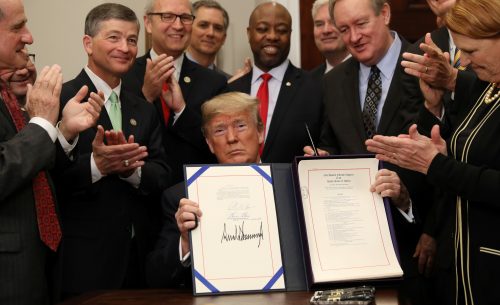The ‘big boys’ can learn trade lessons from smaller states

As China and the United States continue to challenge the rules-based order, small states will certainly suffer. But they are not the only states at risk. Middle-sized and aspiring powers should be concerned about this change. These powers would do well to listen to small states — small economies still have something to offer.
A recent commentary in the Financial Times lays out a foreboding case that the era for small states is coming to an end. It claims that current trends toward protectionism challenge the trade-dependent economies of blooming smaller nations.
Many of the visible troubles relate to the expanding trade war between the United States and China. Rules-based globalism levels the playing field for small states. But this equity is under threat as the major powers attempt to impose new rules that favour their own interests.
Donald Trump believes that current trade deals disadvantage the United States. He wants new or renegotiated deals that are more favourable to US interests. This is a curious reversal of the same criticism anti-globalist movements in Europe and elsewhere level against the United States.
These movements protest trade arrangements such as the Transatlantic Trade and Investment Partnership and the Trans-Pacific Partnership, which the United States drove until Trump’s election in 2016. Protestors argue these arrangements disadvantage European and Asian countries. They allege that the United States imposes rules to benefit corporate interests.
Can it be true that trade deals between the United States and its trading partners disadvantage both parties? While general sentiment suggests mutual disadvantage, it remains unclear how a zero-sum interpretation of trading regimes can in fact exist. David Ricardo’s 200-year-old law of comparative advantage expects that someone always benefits from free trade. But the benefits are not being felt by some sectors of society.
From Trump to Brexit to resurgent populism in Europe, there is undeniably discontent bubbling in many developed nations. Leaders tout simple solutions to address the complex problems fuelling this discontent. While looking simply at one side of an accounts balance — such as a deficit — leads to skewed interpretations of the problem at hand, it provides convenient political targets.
Populist politicians in turn view interests narrowly, relying on a simple understanding of the problems at hand that often reflects the perspective of their domestic support base.
This tempts nations to act unilaterally in an attempt to carve out space in which to enforce rules that preference self-interest. In a globalised world, making that space increasingly requires stepping on someone else’s toes. Setting discriminatory rules also invites retaliation. This is precisely what we have observed in the escalating US–China trade war.
Such populist unilateralism threatens the multilateral system. Too many politicians are looking abroad for scapegoats. But if constituencies on both sides truly are disadvantaged by trade agreements, the issue is most likely internal. It is domestic distribution problems — that is, unequal access to the benefits of trade — that lie at the heart of populist constituencies’ discontent with current international arrangements.
Looking for external targets will neither solve the problems these leaders currently face nor address their supporters’ discontent. The game will soon be up if these problems remain unaddressed.
It might seem in the context of international power politics that small states will go back to suffering what they must. Yet there is still some hope. Small states will continue to be the strongest proponents of a multilateral order regardless of the whims of major powers. Middle-sized states and aspiring regional leaders should see it in their interest to support and strengthen this system.
The successes of small states under rules-based globalism were not only a product of their nimbleness and adaptability to prevailing conditions. As smaller economies, they also had to get their domestic distribution formula correct to improve their citizens’ wellbeing across the board.
As microcosms of larger economies, small states offer an example for larger countries looking for solutions to the problem of discontent in their much larger and more complex economies. Trampling small states underfoot in the name of a zero-sum trade war would only undermine that opportunity for learning.
This article was published by the East Asia Forum. A version of this piece was first published here by RSIS Commentary.
Joel Ng is Research Fellow in the Centre for Multilateralism Studies. His research covers regionalism, norms, and integration in the Global South, focusing on ASEAN and the African Union in particular. He is also an adjunct researcher at the Centre for African Studies of the Nanyang Business School.














